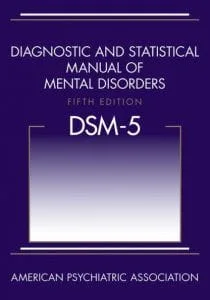5th Edition: DSM-5
For those of you who don’t know the DSM 5 is the book, kind of like a dictionary, that all Mental and Medical Health Professionals refer to when it comes to giving someone a clinical diagnosis. A diagnosis is like a name given to a group of similar symptoms or problems. For example in our daily lives if a person falls, scrapes and bruises her knee we might call it a boo-boo and in the medical field a doctor might describe it as a laceration with ecchymosis. In our daily lives if a person in really having a hard time coping with a big life change, crying a lot and just not able to focus we might say he’s sad while his therapist might diagnosis him with Adjustment Disorder with Depressed Mood - Diagnosis Code 309.0.
In a moment I’ll tell you why you might want to peruse the DSM 5 but first I want to tell you what I don’t want you to do with the information you gleam from the book: This is critical, please DO NOT think for a moment that you can read symptoms, as briefly outlined in the DSM 5, and think you can or should make any kind of diagnosis ever please! Mental Health Professional put a lot into making any diagnosis and all diagnosis are considered temporary due to the circumstances and situations currently present in the person’s life. Diagnosis are not permanent, like tattoos, and in no way to be considered as a way to define a person as a whole. A diagnosis just describes one set of symptoms the person is coming to see the professional for at this particular time. This book is only a dictionary type tool with universal descriptions and code numbers. On the other hand I do recommend you take a peek at the DSM because while it lists and describes literally every diagnosis the descriptions are in a very brief paragraph or bullet list format. It is a super quick outline of characteristics that you can easily get a grip on that might give you a better clue about yourself, other people and what you’re dealing with in the world of emotional politics.
In the DSM 5 there are several common diagnosis that if you read up on them might help you understand yourself and some of the people around you better. For example here are some disorders that most of us are all too familiar with but never knew what to call them. If you or someone you know is overly anxious they might have Generalized Anxiety Disorder – Diagnosis Code 300.02. If you or someone you know is having a really hard time, overly stressed and sad about some changes in their life it might be Adjustment Disorder with Mixed Anxiety and Depressed Mood – Diagnosis Code 309.28. People that are never really able to connect with other people might have Avoidant Personality Disorder – Diagnosis Code 301.82 or the opposite if they are very clingy they might have Dependent Personality Disorder – Diagnosis Code 301.6. We have all meet people who are extremely self-centered, while we use the term narcissist as a common term if you want to know what it really means to be a narcissist there is an actual, clinical diagnosis of Narcissistic Personality Disorder – Diagnostic Code 301.81. Just a quick leaf through the book might give you clearer point of reference?
Diagnostic and Statistical Manual of Mental Disorders DSM DSM-5 resource
